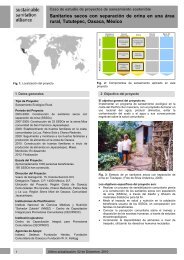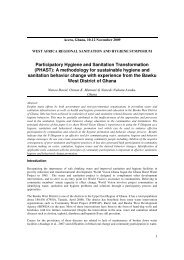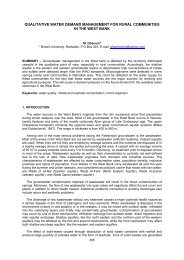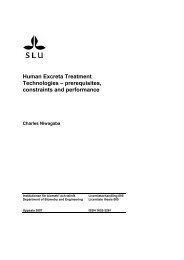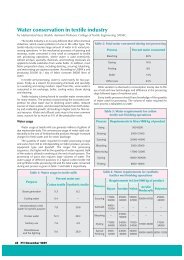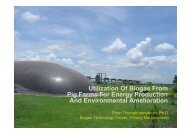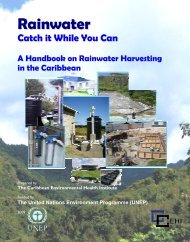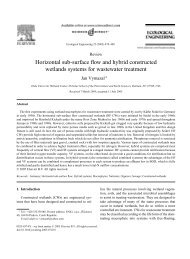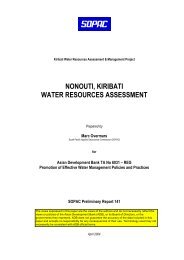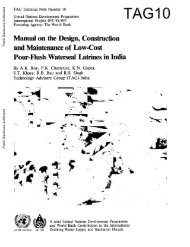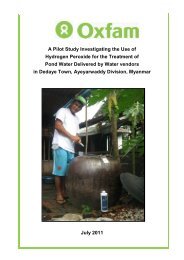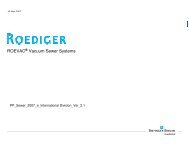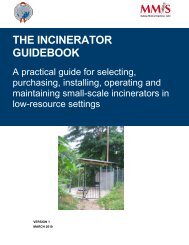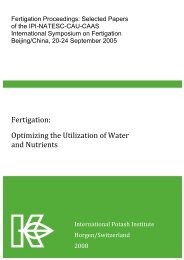Compilation of 13 factsheets on key sustainable sanitation ... - SSWM
Compilation of 13 factsheets on key sustainable sanitation ... - SSWM
Compilation of 13 factsheets on key sustainable sanitation ... - SSWM
Create successful ePaper yourself
Turn your PDF publications into a flip-book with our unique Google optimized e-Paper software.
Figure 3: Knowledge management is the c<strong>on</strong>tinuous process <str<strong>on</strong>g>of</str<strong>on</strong>g><br />
generating new knowledge or repackaging old knowledge; <str<strong>on</strong>g>of</str<strong>on</strong>g><br />
creating a knowledge base; <str<strong>on</strong>g>of</str<strong>on</strong>g> knowledge adaptati<strong>on</strong>; and <str<strong>on</strong>g>of</str<strong>on</strong>g><br />
knowledge transfer (source: Cap-Net, 2004).<br />
Box 1: Knowledge management nodes funded by<br />
SEI<br />
In 2006 the Swedish Development Cooperati<strong>on</strong> (SIDA) and<br />
the Stockholm Envir<strong>on</strong>ment Institute (SEI) launched Phase 2<br />
<str<strong>on</strong>g>of</str<strong>on</strong>g> their EcoSanRes Programme (2006-2011). The main<br />
intenti<strong>on</strong> <str<strong>on</strong>g>of</str<strong>on</strong>g> the initiative was to promote pro-poor <strong>sustainable</strong><br />
sanitati<strong>on</strong> through capacity building and knowledge<br />
management. The programme therefore facilitated the<br />
establishment and development <str<strong>on</strong>g>of</str<strong>on</strong>g> “nodes <str<strong>on</strong>g>of</str<strong>on</strong>g> expertise”<br />
(“knowledge nodes”) that have c<strong>on</strong>ducted regi<strong>on</strong>al projects<br />
dealing with awareness raising, training, policy and regulati<strong>on</strong><br />
reform, R&D, testing and development, dem<strong>on</strong>strati<strong>on</strong> and<br />
social marketing. The programme has established eight<br />
knowledge nodes; <strong>on</strong>e in the Philippines, China, Nepal,<br />
Southern Africa, Uganda, Burkina Faso, Central America and<br />
Bolivia. The nodes have been hosted by renowned research<br />
and knowledge management instituti<strong>on</strong>s and set the<br />
programme c<strong>on</strong>tent and priorities for their respective regi<strong>on</strong>s<br />
individually. The knowledge disseminati<strong>on</strong> and capacity<br />
development activities in the knowledge nodes have so far<br />
resulted in nati<strong>on</strong>al policy changes in the Philippines,<br />
H<strong>on</strong>duras, El Salvador, Bolivia and Uganda and at a regi<strong>on</strong>al<br />
policy level the Manila Declarati<strong>on</strong> was initiated. Although the<br />
funding for the nodes <strong>on</strong>ly lasted for about two years and<br />
stopped in mid 2011, SEI is still collaborating with all nodes<br />
and is planning to c<strong>on</strong>tinue to support the node structure. Also,<br />
the nodes have brought and c<strong>on</strong>tinue to bring financing and<br />
capacity to their hosts.<br />
Further informati<strong>on</strong>: www.ecosanres.org<br />
7 SuSanA partners in capacity building<br />
C<strong>on</strong>venti<strong>on</strong>al capacity building and North-South knowledge<br />
transfer have proven inadequate for scaling up sanitati<strong>on</strong><br />
innovati<strong>on</strong>. A number <str<strong>on</strong>g>of</str<strong>on</strong>g> SuSanA partners, however, have<br />
acted strategically and pi<strong>on</strong>eered a variety <str<strong>on</strong>g>of</str<strong>on</strong>g> promising<br />
approaches. The list <str<strong>on</strong>g>of</str<strong>on</strong>g> examples that follows is not<br />
complete. A similar list, which is c<strong>on</strong>tinuously updated, is<br />
available <strong>on</strong> the SuSanA website: www.susana.org.<br />
The SuSanA secretariat welcomes correcti<strong>on</strong>s or additi<strong>on</strong>s<br />
to this list (info@susana.org or susana@giz.de).<br />
a) Reference centres and knowledge nodes<br />
Water Research Commissi<strong>on</strong> (WRC), (www.wrc.org.za/<br />
Pages/KnowledgeHub.aspx): South African knowledge hub<br />
<str<strong>on</strong>g>of</str<strong>on</strong>g>fers research reports, technical and policy briefs, and<br />
magazine articles <strong>on</strong> water resource management, including<br />
agricultural water use, drinking water, wastewater, and water<br />
for mining, and sanitati<strong>on</strong>. Formerly hosted the SADC Node<br />
for Sustainable Sanitati<strong>on</strong> (SAKNSS) (www.afrisan.org);<br />
which <str<strong>on</strong>g>of</str<strong>on</strong>g>fered learning events and study visits, a stakeholder<br />
database, case studies and publishes regi<strong>on</strong>al Sanitati<strong>on</strong><br />
Matters magazine.<br />
C<strong>on</strong>tact: Ditshego Magoro (ditshegom@win-sa.org.za)<br />
African Regi<strong>on</strong>al Centre for Water and Sanitati<strong>on</strong><br />
(CREPA), (www.reseaucrepa.org): Intergovernmental<br />
organisati<strong>on</strong> with 18 member states in West and Central<br />
Africa; training courses and practical experience in various<br />
technologies and reuse.<br />
C<strong>on</strong>tact: reseaucrepa@reseaucrepa.org)<br />
NETWAS, (www.netwas.org): Hosts former Ugandan<br />
knowledge node; organises training and field dem<strong>on</strong>strati<strong>on</strong><br />
<str<strong>on</strong>g>of</str<strong>on</strong>g> ecological sanitati<strong>on</strong> (ecosan) installati<strong>on</strong>s; has influenced<br />
nati<strong>on</strong>al sanitati<strong>on</strong> strategy.<br />
C<strong>on</strong>tact: Cate Nimanya (netwasuganda@gmail.com)<br />
ENPHO (Envir<strong>on</strong>ment and Public Health Organizati<strong>on</strong>)<br />
(www.enpho.org/resource-center.html): Resource centre in<br />
Nepal; collects, stores and disseminates informati<strong>on</strong> for<br />
educati<strong>on</strong> and advocacy <strong>on</strong> the envir<strong>on</strong>ment and public<br />
health; <str<strong>on</strong>g>of</str<strong>on</strong>g>fers c<strong>on</strong>sultancy services.<br />
C<strong>on</strong>tact: Bushan Tuladhar (bushan.tuladhar@gmail.org)<br />
Centre for Advanced Philippines Studies (CAPS),<br />
(www.caps.ph): Knowledge node <str<strong>on</strong>g>of</str<strong>on</strong>g> SIDA-founded<br />
EcoSanRes programme; secretariat <str<strong>on</strong>g>of</str<strong>on</strong>g> the Academic<br />
C<strong>on</strong>sortium for Sustainable Sanitati<strong>on</strong> (ACSuSan); <str<strong>on</strong>g>of</str<strong>on</strong>g>fers<br />
formal and n<strong>on</strong>-formal courses; has physical library and web<br />
database.<br />
C<strong>on</strong>tact: Dan Lapid (danlapid@caps.ph)<br />
Asociación Centro Ejecutor de Proyectos Ec<strong>on</strong>ómicos y<br />
de Salud (ACEPESA), (www.acepesa.org): One <str<strong>on</strong>g>of</str<strong>on</strong>g> the first<br />
established knowledge nodes for Central America; based in<br />
Costa Rica; supports implementati<strong>on</strong> <str<strong>on</strong>g>of</str<strong>on</strong>g> integral solid waste<br />
management systems based <strong>on</strong> models <str<strong>on</strong>g>of</str<strong>on</strong>g> communal microenterprises;<br />
<str<strong>on</strong>g>of</str<strong>on</strong>g>fers <strong>on</strong>line courses.<br />
C<strong>on</strong>tact: Victoria Rudin (vrudin@acepesa.org)<br />
Regi<strong>on</strong>al Water and Sanitati<strong>on</strong> Network <str<strong>on</strong>g>of</str<strong>on</strong>g> Central<br />
America (RRASCA) and the Nati<strong>on</strong>al Water and Sanitati<strong>on</strong><br />
Networks <str<strong>on</strong>g>of</str<strong>on</strong>g> El Salvador, Guatemala, H<strong>on</strong>duras and<br />
Nicaragua; have c<strong>on</strong>tributed to nati<strong>on</strong>al guidelines for<br />
<strong>sustainable</strong> sanitati<strong>on</strong> and to streamlining <str<strong>on</strong>g>of</str<strong>on</strong>g> gender equity in<br />
projects; helped introduce sustainability criteria in water and<br />
sanitati<strong>on</strong> development plans in H<strong>on</strong>duras and Nicaragua.<br />
C<strong>on</strong>tact: Gloria de Avila (gavila.rases@gmail.com)<br />
Capacity Development: Working Group 1 - page 4



